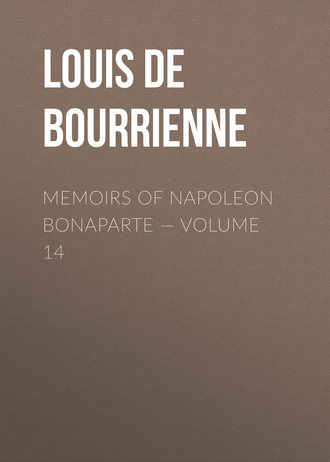
Louis de Bourrienne
Memoirs of Napoleon Bonaparte — Volume 14
"After we had talked the subject over among ourselves, I went to him and strongly pointed out to him how dangerous it might be to prolong his stay. He observed that he could not go without the order. 'Depart, nevertheless,' I replied; your presence on board the ship will still have a great influence over Frenchmen; cut the cables, promise money to the crew, and if the captain resist have him put on shore, and hoist your sails. I have no doubt but Fouche has sold you to the Allies.'— 'I believe it also; but go and make the last effort with the Minister of Marine.' I went off immediately to M. Decres. He was in bed, and listened to me with an indifference that made my blood boil. He said to me, 'I am only a Minister. Go to Fouche; speak to the Government. As for me, I can do nothing. Good-night.' And so saying he covered himself up again in his blankets. I left him; but I could not succeed in speaking either to Fouche or to any of the others. It was two o'clock in the morning when I returned to Malmaison; the Emperor was in bed. I was admitted to his chamber, where I gave him an account of the result of my mission, and renewed my entreaties. He listened to me, but made no answer. He got up, however, and spent a part of the night in walking up and down the room.
"The following day was the last of that sad drama. The Emperor had gone to bed again, and slept a few hours. I entered his cabinet at about twelve o'clock. 'If I had known you were here,' he said, 'I would have had you called in.' He then gave me, on a subject that interested him personally, some instructions which it is needless for me to repeat. Soon after I left him, full of anxiety respecting his fate, my heart oppressed with grief, but still far from suspecting the extent to which both the rigour of fortune and the cruelty of his enemies would be carried."
All the morning of the 29th of June the great road from St. Germain rung with the cries of "Vive l'Empereur!" proceeding from the troops who passed under the walls of Malmaison. About mid-day General Becker, sent by the Provisional Government, arrived. He had been appointed to attend Napoleon. Fouche knew that General Becker had grievances against the Emperor, and thought to find in him willing agent. He was greatly deceived, for the General paid to the Emperor a degree of respect highly to his honour. Time now became pressing. The Emperor, at the moment of departure, sent a message by General Becker himself to the Provisional Government, offering to march as a private citizen at the head of the troops. He promised to repulse Blucher, and afterwards to continue his route. Upon the refusal of the Provisional Government he quitted Malmaison on the 29th. Napoleon and part of his suite took the road to Rochefort. He slept at Rambouillet on the 29th of June, on the 30th at Tours, on the 1st of July he arrived at Niort, and on the 3d reached Rochefort, on the western coast of France, with the intention of escaping to America; but the whole western seaboard was so vigilantly watched by British men-of-war that, after various plans and devices, he was obliged to abandon the attempt in despair. He was lodged at the house of the prefect, at the balcony of which he occasionally showed himself to acknowledge the acclamations of the people.
During his stay here a French naval officer, commanding a Danish merchant vessel, generously offered to some of Napoleon's adherents to further his escape. He proposed to take Napoleon alone, and undertook to conceal his person so effectually as to defy the most rigid scrutiny, and offered to sail immediately to the United States of America. He required no other compensation than a small sum to indemnify the owners of his ship for the loss this enterprise might occasion them. This was agreed to by Bertrand upon certain stipulations.
On the evening of the 8th of July Napoleon reached Fouras, receiving everywhere testimonies of attachment. He proceeded on board the Saale, one of the two frigates appointed by the Provisional Government to convey him to the United States, and slept on board that night. Very early on the following morning he visited the fortifications of that place, and returned to the frigate for dinner. On the evening of the 9th of July he despatched Count Las Cases and the Duke of Rovigo to the commander of the English squadron, for the purpose of ascertaining whether the passports promised by the Provisional Government to enable him to proceed to America had been received. A negative answer was returned; it was at the same time signified that the Emperor would be attacked by the English squadron if he attempted to sail under a flag of truce, and it was intimated that every neutral vessel would be examined, and probably sent into an English port. Las Cases affirms that Napoleon was recommended to proceed to England by Captain Maitland, who assured him that he would experience no ill-treatment there. The English ship 'Bellerophon' then anchored in the Basque roads, within sight of the French vessels of war. The coast being, as we have stated, entirely blockaded by the English squadron, the Emperor was undecided as to the course he should pursue. Neutral vessels and 'chasse-marees', manned by young naval officers, were proposed, and many other plans were devised.
Napoleon disembarked on the 12th at the Isle of Aix with acclamations ringing on every side. He had quitted the frigates because they refused to sail, owing either to the weakness of character of the commandant, or in consequence of his receiving fresh orders from the Provisional Government. Many persons thought that the enterprise might be undertaken with some probability of success; the wind, however, remained constantly in the wrong quarter.
Las Cases returned to the Bellerophon at four o'clock in the morning of the 14th, to inquire whether any reply had been received to the communication made by Napoleon. Captain Maitland stated that he expected to receive it every moment, and added that, if the Emperor would then embark for England, he was authorized to convey him thither. He added, moreover, that in his own opinion, and many other officers present concurred with him, be had no doubt Napoleon would be treated in England with all-possible attention and respect; that in England neither the King nor Ministers exercised the same arbitrary power as on the Continent; that the English indeed possessed generosity of sentiment and a liberality of opinions superior even to those of the King. Las Cases replied that he would make Napoleon acquainted with Captain Maitland's offer, and added, that he thought the Emperor would not hesitate to proceed to England, so as to be able to continue his voyage to the United States. He described France, south of the Loire, to be in commotion, the hopes of the people resting on Napoleon as long as he was present; the propositions everywhere made to him, and at every moment; his decided resolution not to become the pretest of a civil war; the generosity he had exhibited in abdicating, in order to render the conclusion of a peace more practicable; and his settled determination to banish himself, in order to render that peace more prompt and more lasting.
The messengers returned to their Master, who, after some doubt and hesitation, despatched General Gourgaud with the following well-known letter to the Prince Regent:—
ROCHEFORT, 13th July 1815.
ROYAL my enemies.
(Signed) NAPOLEON.
About four P.M. Las Cases and Savory returned to the 'Bellerophon', where they had a long conversation with Captain Maitland, in the presence of Captains Sartorius and Gambler, who both declare that Maitland repeatedly warned Napoleon's adherents not to entertain the remotest idea that he was enabled to offer any pledge whatever to their Master beyond the simple assurance that he would convey him in safety to the English coast, there to await the determination of the British Government.
Napoleon had begun to prepare for his embarkation before daylight on the 15th. It was time that he did so, for a messenger charged with orders to arrest him had already arrived at Rochefort from the new Government. The execution of this order was delayed by General Becker for a few hours in order to allow Napoleon sufficient time to escape. At daybreak, he quitted the 'Epervier', and was enthusiastically cheered by the ship's company so long as the boat was within hearing. Soon after six he was received on board the 'Bellerophon' with respectful silence, but without those honours generally paid to persons of high rank. Bonaparte was dressed in the uniform of the 'chasseurs a cheval' of the Imperial Guard, and wore the Grand Cross of the Legion of Honour.
On entering the vessel he took off his hat, and addressing Captain Maitland, said, "I am come to throw myself on the protection of the laws of England." Napoleon's manner was well calculated to make a favourable impression on those with whom he conversed. He requested to be introduced to the officers of the ship, and put various questions to each. He then went round the ship, although he was informed that the men were cleaning and scouring, and remarked upon anything which struck him as differing from what he had seen on French vessels. The clean appearance of the men surprised him. "He then observed," says Captain Maitland, to whose interesting narrative we refer, "'I can see no sufficient reason why your ships should beat the French ones with so much ease. The finest men-of-war in your service are French; a French ship is heavier in every respect than one of yours; she carries more guns, and those guns are of a larger calibre, and she has a great many more men.'" His inquiries, which were minute, proved that he had directed much attention to the French navy.
On the first morning Napoleon took breakfast in the English fashion, but observing that his distinguished prisoner did not eat much, Captain Maitland gave direction that for the future a hot breakfast should be served up after the French manner. 'The Superb', the Admiral's ship, which had been seen in the morning, was now approaching. Immediately on her anchoring Captain Maitland went on board to give an account of all that had happened, and received the Admiral's approbation of what he had done. In the afternoon Admiral Sir Henry Hotham was introduced to Napoleon, and invited by him to dinner. This was arranged, in order to make it more agreeable to him, by Bonaparte's maitre d'hotel. On dinner being announced Napoleon led the way, and seated himself in the centre at one side of the table, desiring Sir Henry Hotham to take the seat on his right, and Madame Bertrand that on his left hand. On this day Captain Maitland took his seat at the end of the table, but on the following day, by Napoleon's request, he placed himself on his right hand, whilst General Bertrand took the top. Two of the ship's officers dined with the Emperor daily, by express invitation. The conversation of Napoleon was animated. He made many inquiries as to the family and connections of Captain Maitland, and in alluding to Lord Lauderdale, who was sent as ambassador to Paris during the administration of Mr. Fox, paid that nobleman some compliments and said of the then Premier, "Had Mr. Fox lived it never would have come to this; but his death put an end to all hopes of peace."
On one occasion he ordered his camp-bed to be displayed for the inspection of the English officers. In two small leather packages were comprised the couch of the once mighty ruler of the Continent. The steel bedstead which, when folded up, was only two feet long, and eighteen inches wide, occupied one case, while the other contained the mattress and curtains. The whole was so contrived as to be ready for use in three minutes.
Napoleon spoke in terms of high praise of the marines on duty in the Bellerophon, and on going through their ranks exclaimed to Bertrand, "How much might be done with a hundred thousand such soldiers as these!" In putting them through their exercise he drew a contrast between the charge of the bayonet as made by the English and the French, and observed that the English method of fixing the bayonet was faulty, as it might easily be twisted off when in close action. In visiting Admiral Hotham's flag-ship, the 'Superb', he manifested the same active curiosity as in former instances, and made the same minute inquiries into everything by which he was surrounded. During breakfast one of Napoleon's suite, Colonel Planat, was much affected, and even wept, on witnessing the humiliation of his Master.
On the return of Bonaparte from the Superb to the 'Bellerophon' the latter ship was got under weigh and made sail for England. When passing within a cable's length of the 'Superb' Napoleon inquired of Captain Maitland if he thought that distance was sufficient for action. The reply of the English officer was characteristic; he told the Emperor that half the distance, or even less, would suit much better. Speaking of Sir Sidney Smith, Bonaparte repeated the anecdote connected with his quarrel at St. Jean d'Acre with that officer, which has already been related in one of the notes earlier in these volumes. Patting Captain Maitland on the shoulder, he observed, that had it not been for the English navy he would have been Emperor of the East, but that wherever he went he was sure to find English ships in the way.
The 'Bellerophon', with Bonaparte on board, sighted the coast of England on Sunday, the 23d of July 1815, and at daybreak on the 24th the vessel approached Dartmouth. No sooner had the ship anchored than an order from Loral Keith was delivered to Captain Maitland, from which the following is an extract:
Extract of an Order from Admiral Viscount Keith, G. C. B., addressed to Captain Maitland, of H. M. S. "Bellerophon," dated Ville de Paris, Hamoaze, 23d July 1815.
Captain Sartorius, of His Majesty's ship 'Slaney', delivered to me last night, at eleven o'clock, your despatch of the 14th instant, acquainting me that Bonaparte had proposed to embark on board the ship you command, and that you had acceded thereto, with the intention of proceeding to Torbay, there to wait for further orders. I lost no time in forwarding your letter by Captain Sartorius to the Lords Commissioners of the Admiralty, in order that their Lordships might, through him, be acquainted with every circumstance that had occurred on an occasion of so much importance; and you may expect orders from their Lordships for your further guidance. You are to remain in Torbay until you receive such orders; and in the meantime, in addition to the directions already in your possession, you are most positively ordered to prevent every person whatever from coming on board the ship you command, except the officers and men who compose her crew; nor is any person whatever, whether in His Majesty's service or not, who does not belong, to the ship, to be suffered to come on board, either for the purpose of visiting the officers, or on any pretence whatever, without express permission either from the Lords Commissioners of the Admiralty or from me. As I understand from Captain Sartorius that General Gourgaud refused to deliver the letter with which he was charged for the Prince Regent to any person except His Royal Highness, you are to take him out of the 'Slaney' into the ship you command, until you receive directions from the Admiralty on the subject, and order that ship back to Plymouth Sound, when Captain Sartorius returns from London.
It was stated about this time, in some of the English newspapers, that St. Helena would be the place of exile of the ex-Emperor, the bare report of which evidently caused great pain to Napoleon and his suite. General Gourgaud was obliged to return to the 'Bellerophon', not having been suffered to go on shore to deliver the letter from Bonaparte to the Prince Regent with which be had been entrusted. The ship which bore the modern Alexander soon became a natural object of attraction to the whole neighbourhood, and was constantly surrounded by crowds of boats. Napoleon frequently showed himself to the people from shore with a view of gratifying their curiosity. On the 25th of July the number of guard- boats which surrounded the vessel was greatly increased; and the alarm of the captives became greater as the report was strengthened as to the intention of conveying Bonaparte to St. Helena.







